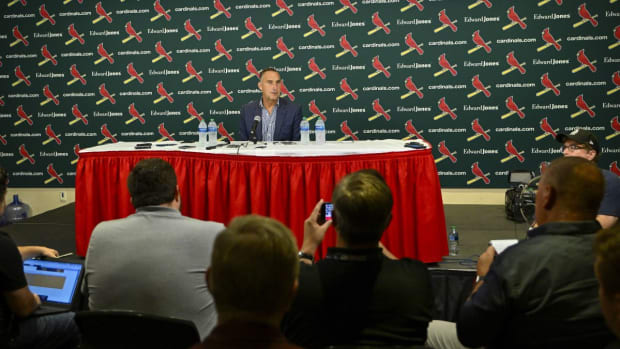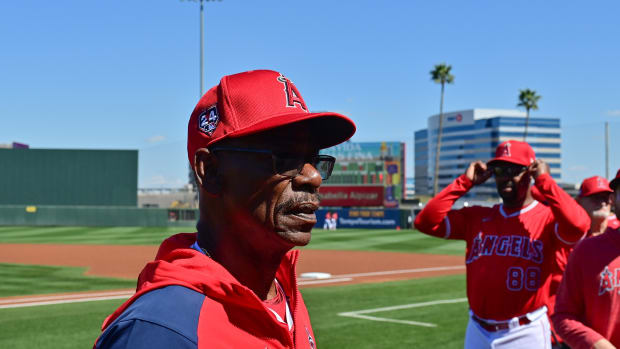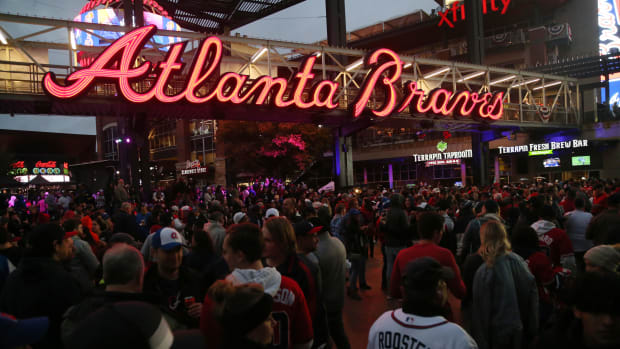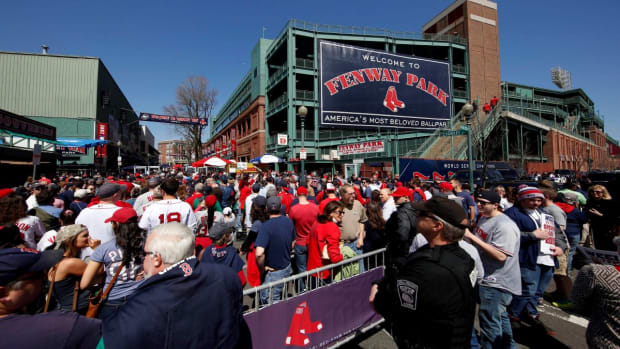The $23 Million Question: Why Do Some Twins Fans Despise Hometown Hero Joe Mauer?
Gaze at the Minnesota Twins’ all-time leaders, and Joe Mauer will be in 27 different categories. Nestled among franchise icons like Harmon Killebrew, Rod Carew and Kirby Puckett, Mauer sits near the top of the the traditional categories (hits, on-base percentage, runs), the favored sabermetric stats (total WAR, weighted runs created, win probability added) and the ignominious distinctions (strikeouts, double plays grounded into, outs made). All of which is to say that Mauer is a lifelong Minnesota Twin, and his No. 7 will likely be retired sometime in the next decade. Mauer announced earlier this month that he will consider retirement in the offseason after 15 seasons in the big leagues
Add his records to his status as hometown hero—the St. Paul-raised three-sport prep star drafted first overall by the Twins—and you’d think his reputation would be pristine in a city fiercely defensive of its own.
That was all true until he made $23 million per year.
A vocal subset of Twins fans want Mauer out, arguing that he is undeserving of the eight-year, $184 million contract he signed in 2010. They cite statistics (he hasn’t hit more than 11 homers since signing the contract after hitting 28 in 2009), his effort level (many questioned why he missed almost half the season with bilateral leg weakness in '11) and his personality (rote and stilted to many). Some think it’s restricted to the darker corners of Twins internet. Others think it’s more than a vocal minority.
Regardless, there is a group that holds Mauer in contempt despite his otherwise immense popularity in his hometown. One fan went as far to customize a t-shirt with $23 MILLION rainbowing over Mauer’s No. 7.
“Some of us started to call him ‘Baby Jesus,’” says Andy Rennecke, a former sportswriter and Twins lifer who is a proud Mauer cynic. “It felt like you couldn’t be critical of Joe because everybody felt like he walked on water. He was one of us. How dare anyone be critical of him.”
To the outsider, it’s hard to fathom why any fan would begrudge Mauer. His 2009 MVP campaign was one of the most astonishing seasons of any hitter over the last two decades (.365/.444/.587 with a 171 OPS+), and he’s a six-time All-Star who has finished top-10 in the MVP voting four times. Last season, he .305/.384/.417 in 141 games to help the Twins to their first playoff appearance since 2010. He’s remained with the Twins throughout several losing stretches instead of clamoring for a chance to compete for a World Series ring.
He might be most notable for fulfilling every positive stereotype of Minnesotans. When he was maybe the most sought-after athlete in the entire country as a five-star quarterback prospect committed to play at Florida State, Mauer maintained a slow-spoken and humble demeanor hardly befitting of a 6’4” superstar. During his career with the Twins, he’s remained his assiduous self and used his social media presence mostly to be a doting dad. He used the same at-bat music—T.I.’s “What You Know”—for 13 consecutive seasons.
“Had [Mauer] left for the Red Sox or Yankees in 2010, those same fans who are calling for his head now would have burned down Target Field,” says Aaron Gleeman, Editor-in-Chief of Baseball Prospectus and host of the Twins podcast Gleeman and the Geek. “There are all sorts of these inferiority complexes at play and there are some fans where no amount of context matters, they just like to get mad.”
His laconic disposition doesn’t endear himself to everyone, and those critics are further emboldened by the team’s disappointing 2018 campaign. After reaching the AL Wild-Card Game last year against the Yankees, Minnesota is 72–83 as the season nears its conclusion. Mauer’s fine if unremarkable season sits at .276/.344/.374 with six homers, his lowest total in a season which he’s played over 100 games. Rennecke says the fan base didn’t really sour on Mauer until 2011, when the $23 million man played only 82 games because of bilateral leg weakness—an injury indecipherable and thus unacceptable to a lot of the fan base.
“Joe’s personality lends itself to a lot of ridicule. He shows no emotions, he’s always the same guy. He’s almost like a robot,” Rennecke says. “So, when he was suffering from a mysterious injury like “bilateral leg weakness” in 2011 and getting $23 million per season while the team was tanking, fans started to rebel against him.
“In Minnesota, we're hardworking people and don't like it if you're being paid and you’re not out there performing.”
The calculus of fans like Rennecke is common and understandable on-face: The handsomely paid players should be stars on the field. Mauer was the team’s best hitter, so he should have routinely hit over .300 with 20-plus homers and bundle of runs driven in. The simple view (or simplistic one, depending on your perspective) was that being a run creator was more important than being a patient hitter; swing at a pitch outside the zone if it means you could drive a run in. Emboldening to some fans and heretical to the sabermetric community, this view bears striking resemblance to the local criticism of Cincinnati’s Joey Votto—another former MVP derided by some local fans, columnists and radio hosts for being too smart at the plate.
Mauer’s average rarely dipped after the contract, but his only great power season came in 2009, and it sapped even further after he suffered a concussion in '11. This is what seems to miff Gleeman the most: He doesn’t think Mauer’s critics account for the severity of the season-ending concussion that the catcher sustained in August 2013. Mauer concluded the season hitting .324/.404/.476 with a 142 OPS+, almost perfectly in line with his career line of .323/.405/.468 and a 135 OPS+. Since the injury and subsequent move to first base in '14, though, Mauer’s production dipped to .277/.358/.387 and a 104 OPS+.
“There was a perception that he tricked the Twins after the MVP season,” Gleeman says. “But he stopped being a .320 hitter and became a .275 hitter after the concussion.”
The Twins were also terrible after Mauer got paid. From 2011 to '18, the Twins endured four consecutive 90-plus loss seasons and a 103-loss year in '16, while compiling just two winning seasons and appearing in one playoff game. The Twins didn’t surround Mauer with much talent, and the perception was that Mauer was hogging the money.
“Let’s look at the real thing, and that’s the W-L record. He’s a great player, a Twins Hall of Famer, but he’s also one of most overrated players of his generation,” Rennecke says. “He’s a singles hitter that turned one big year into a huge contract. He’s Minnesota’s Ryan Howard.”
Gleeman exudes an unabashed love for baseball and infectious friendliness, but the argument that Mauer’s bloated contract precluded the Twins from signing better players triggers an anxious calm. Part of me expected the Kill Bill Ironside Siren to begin playing before his answer.
“I think this is true of all sports and all fans in that they will very often side with the billionaires over the millionaires,” Gleeman says. “In Minnesota every dollar is treated as not another player, perception that $23 million has kept them from signing others when the team has not filled their payroll base. The family that owns the Twins are multi-billionaires who own huge businesses around Minnesota. I don’t want them to go nuts, I just want them to spend 51% of their revenue. They don’t do that.”
Now that Mauer is a pending free agent, the question will be resolved soon. He might retire or he might sign with a team to be a DH or bench bat to try to make a deep run in the playoffs.
What’s clear, however, is that Mauer, once considered the franchise savior will likely finish his vaunted Twins career 0–10 in the playoffs. The question is whether that’s a fair basis to judge his 15 years as a member of the hometown team.
“The front office’s ineptitude is mainly the reason that the franchise has been in disarray since the beginning of 2011,” Rennecke says. “But, there’s Joe. He’s still here. And he’s the scapegoat ... like it or not.”
For most Twins fans, the end of the 2018 season might be the end for one of the city’s most beloved players. For Rennecke and the cynics, that annual $23 million price tag will finally be off the books.



































